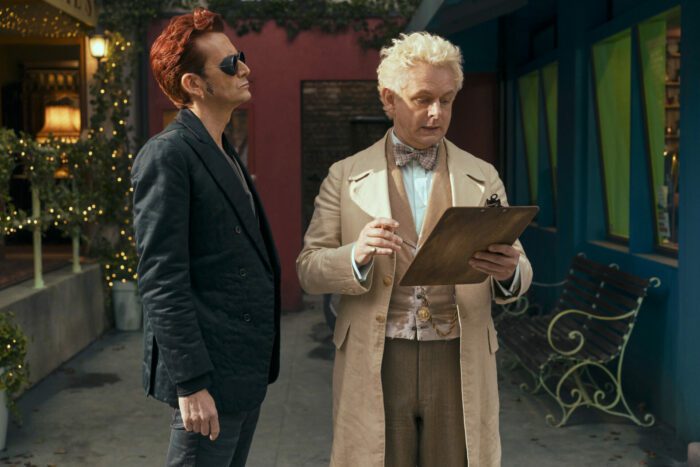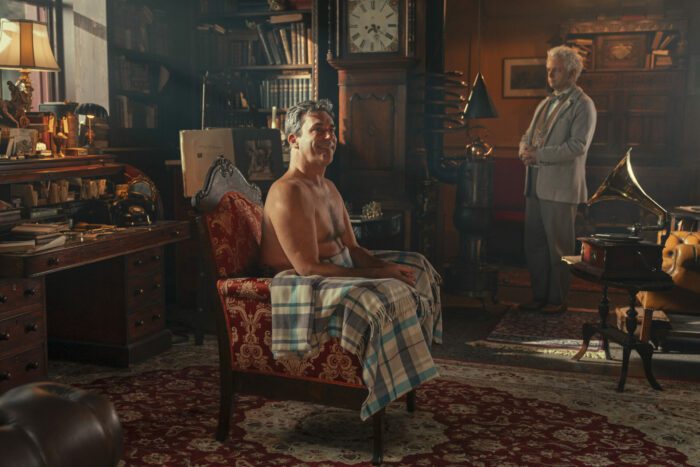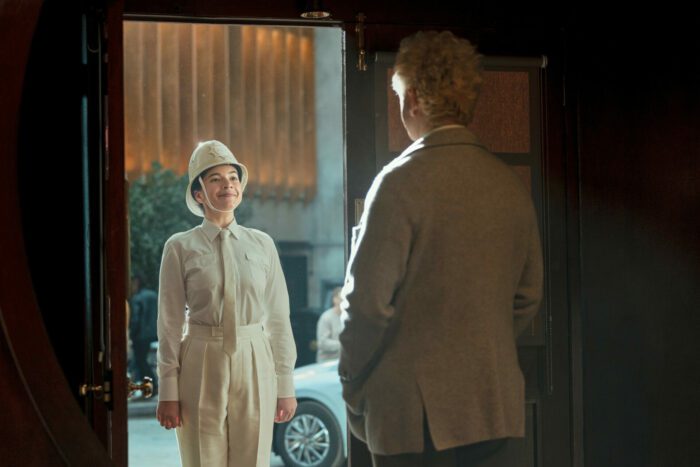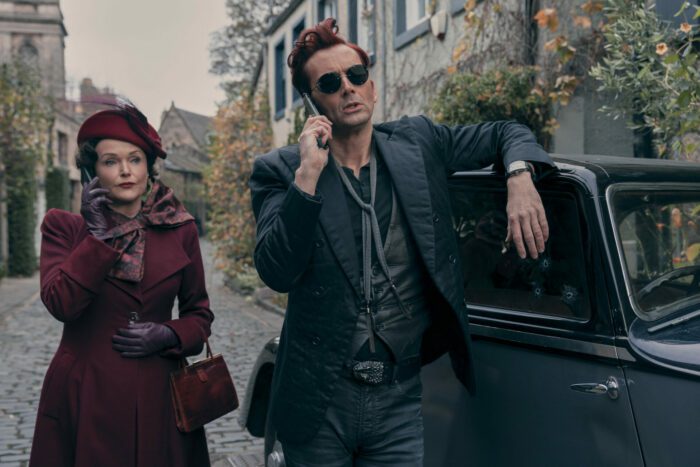The following review contains spoilers for Good Omens Season 2 on Prime Video.
Editor’s Note: This piece was written during the 2023 WGA and SAG-AFTRA strikes. Without the labor of the writers and actors currently on strike, the series being covered here wouldn’t exist.
After the wild success of Good Omens on Prime Video, Neil Gaiman took an unexpected turn and wrote the second season from scratch. Where the first season was based on the novel Good Omens by Gaiman and Terry Pratchett, creating an incredibly faithful adaptation with one author at the helm of production, this new season is, well, new.
Despite loving the series and being delighted to see David Tennant and Michael Sheen back together again, this second season doesn’t live up to the brilliance of its conception story.
From the get-go, Season 2 seems much less rounded and based in biblical lore. I mean, when you begin a series with the Antichrist and solve that problem with a nice red bow, how do you move forward? Gaiman and his team—John Finnemore, Cat Clarke, Jeremy Dyson, and Andy Nyman—were stuck between a rock and a hard place.

I have to say that I wanted more of the isolated minisodes showing glimpses into the past of Aziraphale and Crowley’s friendship—it was exactly what kind of stories would fuel the fandom. The Good Omens’ interpretation of the Story of Job was remarkable. However, the overarching storyline for the season was flimsy and danced around the underlying motif rather than leaning into the lesson—there are flaws in the institutions of Heaven and Hell, and neither represents the ultimate good or evil; morality is much more complicated than that construct.
It’s clear the direction Good Omens is going will combat the archetypes of Angels vs Demons and the intrinsic evil involved in the absolute authority of God. Although, with this finale, I have a strong hunch that Neil Gaiman is aiming for a third season, which presents the problem where this season then feels incredibly middle-y. We’re now waiting for the bigger shoe to drop, not entirely focused on what’s happening in front of us because it’s not captivating or essential enough in the grander scheme of things.
I was excited about all the promotional hints about Good Omens Season 2 being a love story because I thought it meant Crowley and Aziraphale were finally getting together. Instead, a different angel and demon get their version of a happy ending in the most lacklustre and confusing plotline. When a story ends with a bunch of characters standing around in a circle arguing over what to do about their version of Romeo and Juliet, it’s not precisely golden material. Nor is learning that all the little clues we see through the season only make sense through a character’s resurgence after memory loss.

I had a lot of hope for this show. I love David Tennant and Michael Sheen as a duo, their chemistry is fantastic, and they do an excellent job with the material they’re given. I found the pseudo breakup in the finale quite moving while staying incredibly true to character. The little dialogue sprinkled throughout the season about how they do things for one another and how they can anticipate the other’s moves and needs—it’s wonderful!
I found the story of Nina (Nina Sosanya) and Maggie (Maggy Service) fun to follow. I thought the effort of Crowley and Aziraphale to push these two together was in the same spirit and vein as the characters’ previous miracle work together.

The introduction of Uriel (Gloria Obianyo) was a riot. Gloria Obianyo was such a treat as she fumbled through service as an Angel on the ground. Her presence brought out this paternal side of Crowley and Aziraphale that fleshed out their soft edges and impeccable compatibility. The innocence of Uriel and Obianyo’s performance was flawless compared to the bumbling performance of Jon Hamm, which rang shallow and much too goofy.
Miranda Richardson’s addition to the cast felt well placed; her previous work as Rita Skeeter in Harry Potter and The Goblet of Fire prepared her to play a demon with little patience and terrible problem-solving instincts. However, the recasting of Beelzebub from Anna Maxwell Martin to Shelley Conn did not feel well placed. At first, Conn was doing a passable impression of Martin’s performance, but as time passed, that grody essence seemed to fade away. When push came to shove, and all was revealed, Conn’s Beelzebub no longer held any remnants of the insect demon which once was.

When David Tennant plays into the softness of Crowley, there’s always a jaded edge that remains. There’s always something there that shows he’s still his crooked, hell-bent self. But Conn’s Beelzebub’s original grit is replaced by the shimmery soft light of romance—none of what made Beelzebub the repulsive demon remained. It’s part of what makes this romance between Gabriel and Beelzebub so flimsy; neither seemed to carry their character into the relationship—they both became alternate versions of themselves.
It’s disheartening that so much of the overarching narrative hinged on this star-crossed lover reveal when there was so much other material for Neil Gaiman to expand on. Each time we got a glimpse into the past of Aziraphale and Crowley, my ears perked up. I would have been so happy if it was an entire season of just those tales and triumphs. Out of all the star-crossed lovers in this cinematic universe, Aziraphale and Crowley surely deserve a happy ending the most. Alas, it could never be that simple.

